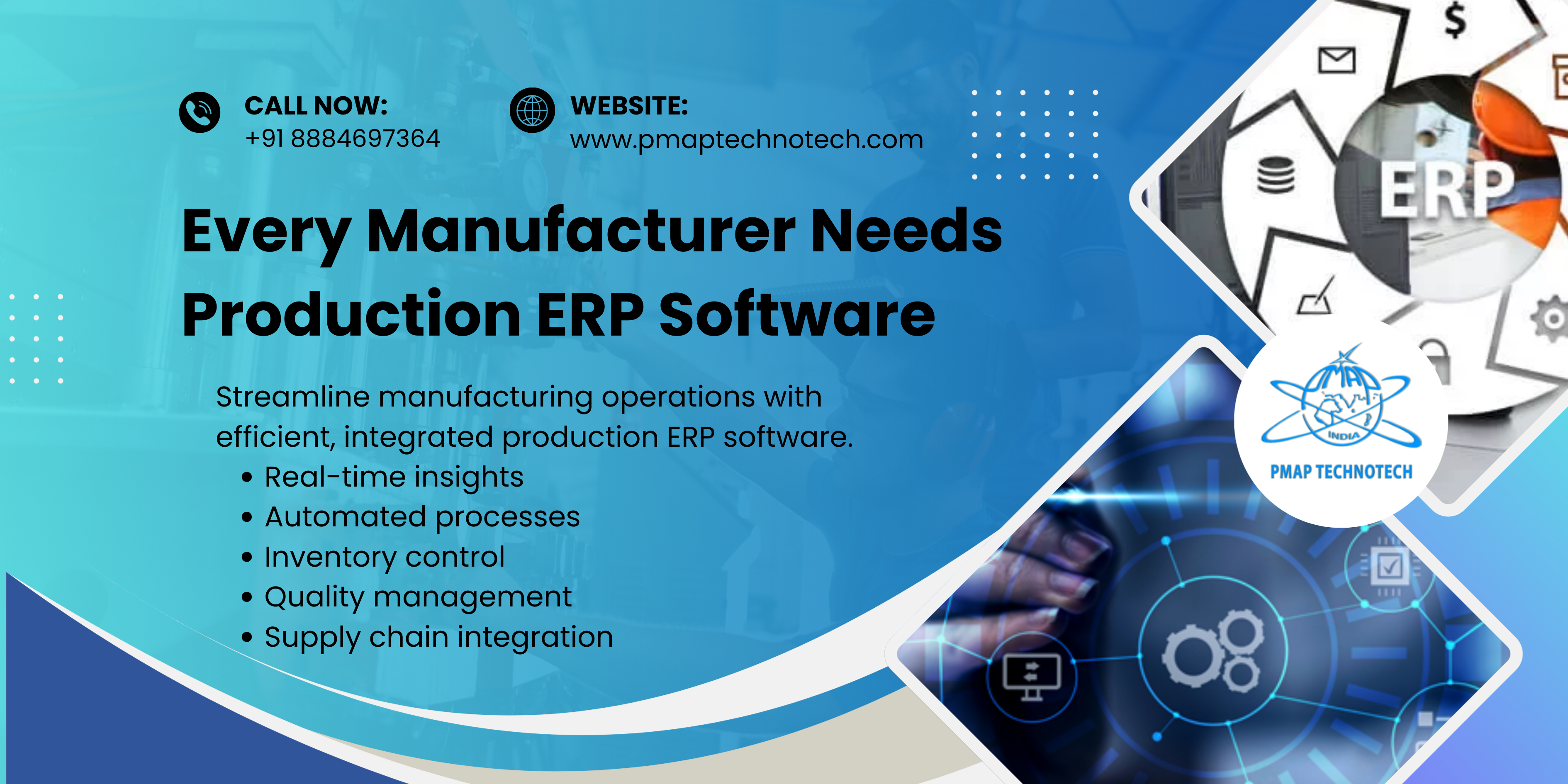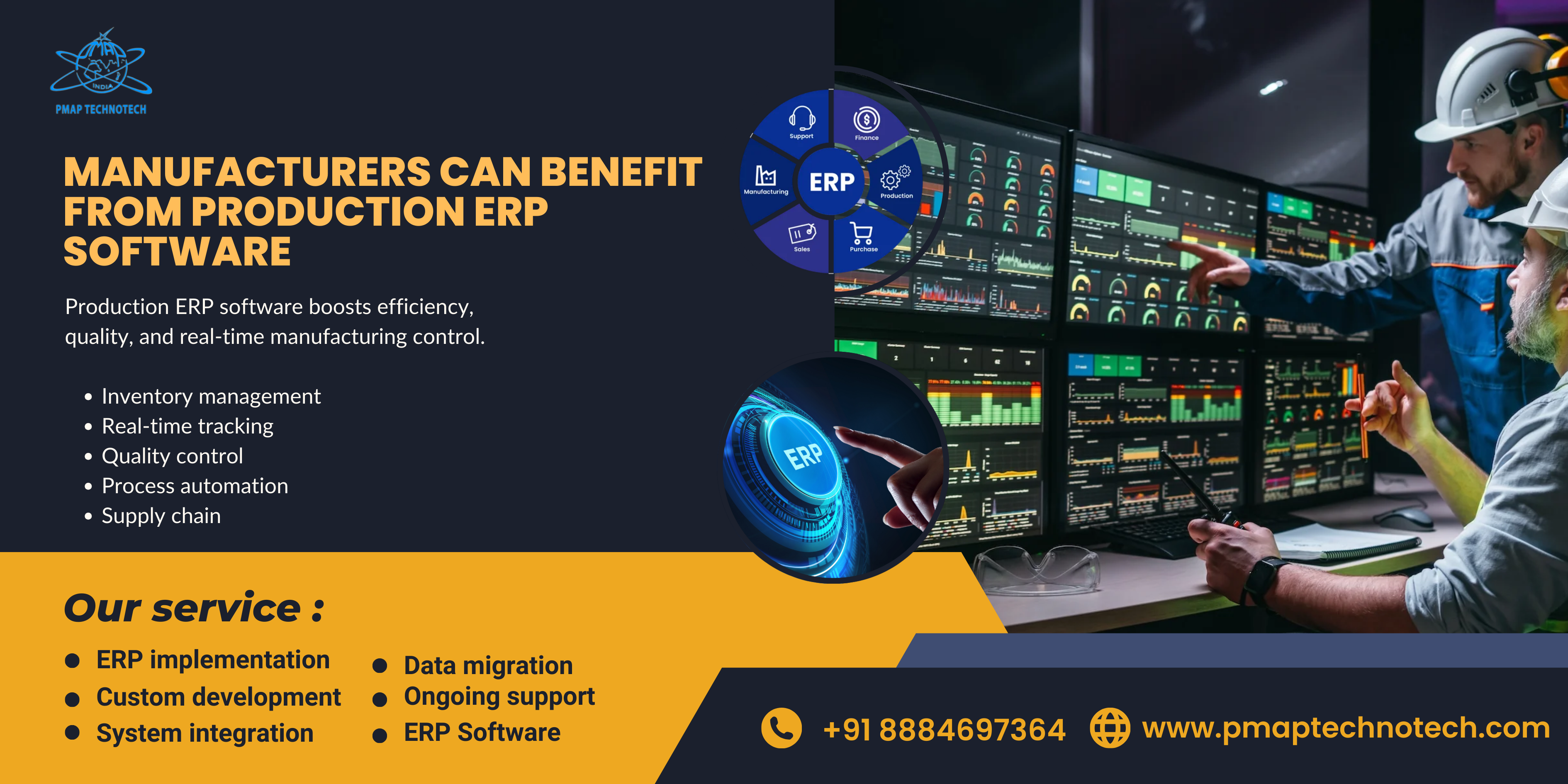In today's highly-competitive manufacturing environment, companies cannot afford slow production cycles. Also, they cannot afford to have a poor inventory management system and disconnected operations on the shop floor. Modern manufacturers need real-time insights, automated processes, and streamlined operations to stay competitive. Production ERP software can help. It is a powerful platform that integrates supply chain coordination with inventory control and quality management.
Production ERP software helps you to improve productivity, decrease downtime and streamline workflows. Software solutions today can tackle any manufacturing challenge.
This blog will explore Production ERP software, its key features, its benefits for manufacturers, and the impact on supply chain planning and production planning. It will also examine real-world examples and industry-specific applications. We will also examine future trends in ERP.

Production ERP is an Enterprise Resource Planning system that was designed specifically for manufacturing companies. Production ERP is a type of Enterprise Resource Planning system (ERP) that was developed specifically for manufacturing firms. Production ERP software is a specialized type of Enterprise Resource Planning (ERP) system that was built specifically for manufacturing companies.
It is the central nervous system for manufacturing. It connects departments like production planning, shop floor operations, inventory management and quality assurance to work together seamlessly. Instead of using separate, disconnected tools for each function, production ERP software brings all manufacturing-related data into one place, making processes faster, more accurate, and easier to control.
Production ERP software is much more than just a digital record-keeping program. This is an integrated platform that combines all aspects of manufacturing operations, including planning, execution and monitor into one system. This article will look at some of the key features and their importance for manufacturers.
This feature helps manufacturers plan production, schedule jobs and allocate resources as efficiently as they can. It generates optimal production plans based on demand forecasts and inventory levels.
Bottlenecks in production lines and inactivity can cause missed deadlines. Production planning ERP ensures that operations run smoothly by ensuring every task is completed at the correct time and location.
A discrete manufacturer uses production scheduling software to prioritize orders that are critical and to avoid late deliveries.
What is it? ERP gives shop-floor management a real time view of manufacturing activities, including tracking work order, machine output, operators output and production status.
Minor problems in the shop can quickly turn into major delays if not addressed immediately. Monitoring in real time allows quick intervention to keep production moving.
A factory automation Production ERP software system in a packaging facility will send an alert to maintenance staff if the speed of the conveyor belt falls below normal. This avoids a total production stop.
It is a system that tracks and manages raw materials, semi-finished goods, and finished products throughout the entire production process.
A large stock can lead to increased storage costs and capital binds, while a smaller inventory can lead to production delays.
When the wood stock in a furniture factory falls below a threshold, an ERP manufacturing software automatically orders panels. The production will never be stopped.
What it does: It is a system that manages inspection processes, compliance and quality checks in the ERP system.
Unsatisfactory quality can result in waste, rework, and unhappy customers. Integrated quality control can help to detect issues early.
A process manufacturing company uses quality management to ensure that every batch of production meets food safety standards prior to leaving its plant.
What it is: This software connects ERP systems with suppliers, logistics providers, and procurement departments.
Delays in raw materials can disrupt the production schedule. Integration of ERP and supply chain management ensures that suppliers understand production requirements.
A manufacturer of auto parts uses software for supply chain management to track the steel shipments. If a shipment delay is detected, the system will automatically adjust the production schedule.
What is it? It's a system that connects machines, sensors, and other production equipment to the Production ERP software system in order to automate data collection.
Manual data entry is slow and prone to errors. Automated reporting of production ensures accuracy, consistency and speed.
ERP software integrates temperature sensors into furnaces. The system will automatically adjust and alert if temperatures fall outside of the set range.
What it does: Calculates actual production costs based on data such as labor, material, energy consumption and overhead.
Manufacturers need to know the true cost of their products in order to maintain profitability.
A software program that optimizes the manufacturing process in a plastics plant identifies an energy-consuming machine, which increases costs. The maintenance is then reviewed.
What it is: This ERP supports discrete manufacturing, process manufacturing and mixed-mode manufacturing.
Several industries produce both unique and batch-based products. Flexibility will be increased by a system that can handle both.
The discrete manufacturing of aircraft parts is done by a company using ERP discrete manufacturing. The company also uses ERP Process Manufacturing for the chemical coatings of those parts.
Centralized software control can help manufacturers optimize their workflows, and reduce the amount of wasted time.

Real-time monitoring software allows managers to resolve issues before they escalate.
Software for production planning allows manufacturers to:
Use discrete manufacturing ERP to manage multiple assembly lines. Improve delivery rates and reduce machine downtime by 20%.
ERP can be implemented in manufacturing processes to automate the tracking of batches, maintain quality control, and ensure compliance with regulations.
Software for manufacturing process optimization was implemented to integrate IoT sensors with ERP. This allows predictive maintenance, and prevents costly failures.
Answer: The Production ERP is a special Enterprise Resource Planning software designed for manufacturers. It integrates shop floor management and inventory into one platform, improving efficiency and reducing costs.
Answer: While a general Production ERP software system covers finance, HR, and basic operations, Production ERP focuses on manufacturing-specific needs such as scheduling, shop floor monitoring, raw material tracking, and quality checks. It's designed for discrete, mixed-mode, and process manufacturing industries.
Answer: The following are some of the key benefits:
Answer: Yes. Production ERP reduces waste by automating workflows and optimizing materials usage, reducing errors and tracking actual costs vs. budgeted costs.
Answer: It is a great tool for industries like aerospace, automotive, food processing, chemicals and pharmaceuticals. It supports discrete manufacturing, mixed-mode production, and process manufacturing.
Answer: Absolutely. Modern ERP systems can be customized to fit the needs of SMEs. Cloud-based ERP systems are especially cost-effective as they require less initial investment.
Answer: It integrates with logistics and suppliers, tracks orders for raw materials, synchronizes the lead times and gives real-time visibility to the entire supply chain. This ensures smoother procurement and on-time deliveries.
Answer: IoT sensors allow machines to be monitored in real time and for predictive maintenance. Production ERP software uses predictive analytics to help with demand forecasting, analysis of costs, and making decisions.
Answer: Cloud ERP provides scalability and remote access. It also offers lower initial costs, as well as easier updates. Larger enterprises that require strict data control may benefit from on-premise Production ERP software. Budget, infrastructure and security requirements will determine the choice.
Answer: AI-powered decision making, IoT enabled smart factories, robotic automation and cloud-based ERP platform are the future. Production ERP software will be the backbone for intelligent and data-driven manufacturing with Industry 4.0.
In an industry where time, cost and quality are key factors in determining success, production ERP software is essential. Software can make manufacturers work more efficiently.
Software tailored to specific industries can be beneficial for businesses in discrete manufacturing or process manufacturing. The business will benefit from increased visibility, improved production planning, efficient supply chains, and higher profitability. ERP Software for Manufacturing Industry systems will become more advanced as technology progresses, including AI and IoT.